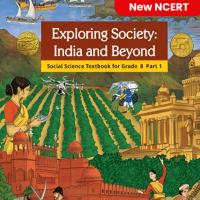Class 8 Exam > Class 8 Questions > Identify the programming paradigm described b...
Start Learning for Free
Identify the programming paradigm described below:
- It emphasizes the use of functions and their interactions.
- Functions can be treated as first-class citizens.
- It avoids changing-state and mutable data.
- It is commonly used in languages like Haskell and Lisp.
- a)Procedural Programming
- b)Object-Oriented Programming
- c)Functional Programming
- d)Logic Programming
Correct answer is option 'C'. Can you explain this answer?
Verified Answer
Identify the programming paradigm described below: It emphasizes the u...
The description matches Functional Programming, which emphasizes the use of functions, treats them as first-class citizens, and avoids mutable data.

|
Explore Courses for Class 8 exam
|

|
Question Description
Identify the programming paradigm described below: It emphasizes the use of functions and their interactions. Functions can be treated as first-class citizens. It avoids changing-state and mutable data. It is commonly used in languages like Haskell and Lisp.a)Procedural Programmingb)Object-Oriented Programmingc)Functional Programmingd)Logic ProgrammingCorrect answer is option 'C'. Can you explain this answer? for Class 8 2025 is part of Class 8 preparation. The Question and answers have been prepared according to the Class 8 exam syllabus. Information about Identify the programming paradigm described below: It emphasizes the use of functions and their interactions. Functions can be treated as first-class citizens. It avoids changing-state and mutable data. It is commonly used in languages like Haskell and Lisp.a)Procedural Programmingb)Object-Oriented Programmingc)Functional Programmingd)Logic ProgrammingCorrect answer is option 'C'. Can you explain this answer? covers all topics & solutions for Class 8 2025 Exam. Find important definitions, questions, meanings, examples, exercises and tests below for Identify the programming paradigm described below: It emphasizes the use of functions and their interactions. Functions can be treated as first-class citizens. It avoids changing-state and mutable data. It is commonly used in languages like Haskell and Lisp.a)Procedural Programmingb)Object-Oriented Programmingc)Functional Programmingd)Logic ProgrammingCorrect answer is option 'C'. Can you explain this answer?.
Identify the programming paradigm described below: It emphasizes the use of functions and their interactions. Functions can be treated as first-class citizens. It avoids changing-state and mutable data. It is commonly used in languages like Haskell and Lisp.a)Procedural Programmingb)Object-Oriented Programmingc)Functional Programmingd)Logic ProgrammingCorrect answer is option 'C'. Can you explain this answer? for Class 8 2025 is part of Class 8 preparation. The Question and answers have been prepared according to the Class 8 exam syllabus. Information about Identify the programming paradigm described below: It emphasizes the use of functions and their interactions. Functions can be treated as first-class citizens. It avoids changing-state and mutable data. It is commonly used in languages like Haskell and Lisp.a)Procedural Programmingb)Object-Oriented Programmingc)Functional Programmingd)Logic ProgrammingCorrect answer is option 'C'. Can you explain this answer? covers all topics & solutions for Class 8 2025 Exam. Find important definitions, questions, meanings, examples, exercises and tests below for Identify the programming paradigm described below: It emphasizes the use of functions and their interactions. Functions can be treated as first-class citizens. It avoids changing-state and mutable data. It is commonly used in languages like Haskell and Lisp.a)Procedural Programmingb)Object-Oriented Programmingc)Functional Programmingd)Logic ProgrammingCorrect answer is option 'C'. Can you explain this answer?.
Solutions for Identify the programming paradigm described below: It emphasizes the use of functions and their interactions. Functions can be treated as first-class citizens. It avoids changing-state and mutable data. It is commonly used in languages like Haskell and Lisp.a)Procedural Programmingb)Object-Oriented Programmingc)Functional Programmingd)Logic ProgrammingCorrect answer is option 'C'. Can you explain this answer? in English & in Hindi are available as part of our courses for Class 8.
Download more important topics, notes, lectures and mock test series for Class 8 Exam by signing up for free.
Here you can find the meaning of Identify the programming paradigm described below: It emphasizes the use of functions and their interactions. Functions can be treated as first-class citizens. It avoids changing-state and mutable data. It is commonly used in languages like Haskell and Lisp.a)Procedural Programmingb)Object-Oriented Programmingc)Functional Programmingd)Logic ProgrammingCorrect answer is option 'C'. Can you explain this answer? defined & explained in the simplest way possible. Besides giving the explanation of
Identify the programming paradigm described below: It emphasizes the use of functions and their interactions. Functions can be treated as first-class citizens. It avoids changing-state and mutable data. It is commonly used in languages like Haskell and Lisp.a)Procedural Programmingb)Object-Oriented Programmingc)Functional Programmingd)Logic ProgrammingCorrect answer is option 'C'. Can you explain this answer?, a detailed solution for Identify the programming paradigm described below: It emphasizes the use of functions and their interactions. Functions can be treated as first-class citizens. It avoids changing-state and mutable data. It is commonly used in languages like Haskell and Lisp.a)Procedural Programmingb)Object-Oriented Programmingc)Functional Programmingd)Logic ProgrammingCorrect answer is option 'C'. Can you explain this answer? has been provided alongside types of Identify the programming paradigm described below: It emphasizes the use of functions and their interactions. Functions can be treated as first-class citizens. It avoids changing-state and mutable data. It is commonly used in languages like Haskell and Lisp.a)Procedural Programmingb)Object-Oriented Programmingc)Functional Programmingd)Logic ProgrammingCorrect answer is option 'C'. Can you explain this answer? theory, EduRev gives you an
ample number of questions to practice Identify the programming paradigm described below: It emphasizes the use of functions and their interactions. Functions can be treated as first-class citizens. It avoids changing-state and mutable data. It is commonly used in languages like Haskell and Lisp.a)Procedural Programmingb)Object-Oriented Programmingc)Functional Programmingd)Logic ProgrammingCorrect answer is option 'C'. Can you explain this answer? tests, examples and also practice Class 8 tests.

|
Explore Courses for Class 8 exam
|

|
Signup for Free!
Signup to see your scores go up within 7 days! Learn & Practice with 1000+ FREE Notes, Videos & Tests.























